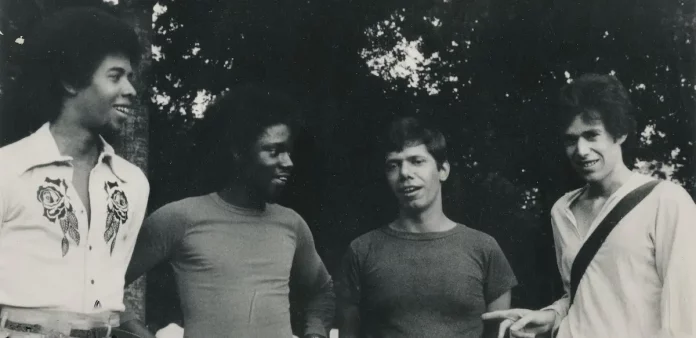The dilemma facing Chicle Corea was clearly visible during this performance. While desiring a wide audience with which to communicate, and so producing simple and tuneful rock, Corea is still interested in the subtle interaction possible in a jazz improvisation, and in the more sophisticated potentials of the instruments used.
Thus the concert included both group and solo music. During Stanley Clarke’s tune ‘After the Cosmic Rain’ Clarke (on bass guitar) and Corea made an attempt at interaction by soloing alternately, but only managed rather crude imitation of each other. They were no more successful in a closely similar repeat later in the evening. Bill Connors (guitar) and Corea came nearer to stimulating each other, and in a series of rather competitive alternations between Clarke and Connors, the latter achieved one quite remarkable burst, although Clarke relied mainly on clichés.
Altogether, the group numbers achieved little spontaneity, but were smooth and precise. Lenny White, on drums, was taut and accurate, but he showed that the rock drummer’s function is still that of fairly monotonous timekeeping. Connors was not clearly audible, but he seemed less relaxed and forthcoming than the others. Of course, Corea’s playing, on electric piano, was as technically brilliant and rhythmically supple as ever, if less adventurous harmonically and melodically. Clarke was excellent on bass guitar, if rather uninventive.
The three solo items came together in the middle of the performance. First Corea played a ‘Spanish Interlude’, which included ‘Sometime Ago’ from the group’s first album. He introduced no extension of his musical vocabulary, but used a pitch fluctuating device to slight excess. Next, Clarke played string bass, with rather inaccurate intonation. His bowed opening was lacking in acoustic penetration, but when he moved to pizzicato his attack grew fiercer and the audience responded to his simple riffs and occasional bursts of rapid movement. Although Clarke is certainly a fine bass player, the obvious comparison with Dave Holland’s solo on the ‘Circle’ ECM records is rather unflattering – Clarke seemed to lack the imagination necessary for a sustained solo improvisation. Similarly, White might be compared unfavourably with Barry Altschul, but his solo was not without interest.
Corea smiled throughout the evening, and perhaps this helped the group to communicate some sense of relaxation and enjoyment. Although the large audience loved it, I longed for the return of ‘Circle’.
***
Return To Forever At The Rainbow, March 15, 1974.
















